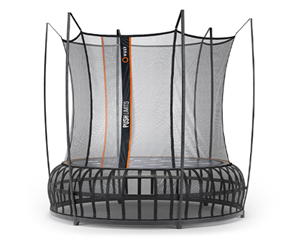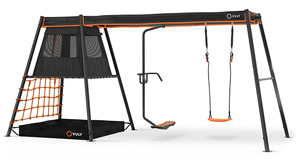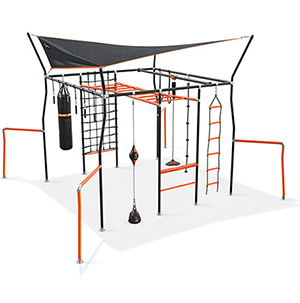Olympic Trampolines Vs. Gymnastics Trampolines Vs. Backyard Trampolines
Jan 21, 2024
5 mins
Trampolines are a true triple threat—they shine bright whether they're in a backyard, gymnastics, or Olympic setting.
Aside from being a kid's favourite summer activity and your parents' go-to exercise tool, trampolines also play a major role in professional sport.
Being more than child's play or a means of fitness, trampolining is also deemed an Olympic sport. Trampoline gymnasts are people who took their childhood hobby into adulthood and turned jumping into an art and a career.
That being said, it's important to note that there are stark differences between a backyard trampoline and an Olympic trampoline or gymnastics trampoline.
Whether you're looking to score a gold medal or give your family the gift of backyard bounce-scapades, this guide will point you in the right direction.
Olympic Trampolines & Gymnastics Trampolines
As the name suggests, Olympic or gymnastics trampolines are used by athletes for professional training and competitions.
The trampolines you find at gymnastics clubs are likely to be of the same size as the ones used at Olympic competitions, which are the standard 10 ft. by 17 ft. This is to ensure they're well trained with the trampoline size and quality that will be used at competitions. However, some trampoline clubs use 9 ft. by 15ft. frames to accommodate more sets in a given space.
While the fundamental purpose of both backyard and Olympic/gymnastics trampolines may be to bounce and tumble, there are a myriad of differences between the trampolines used by experts and the ones used for recreational purposes at home.
Shape
There are plenty of trampoline shapes available on the market, but the preferred shape for athletes is rectangular as it's the standard one used for competitions.
Trampoline Base
Given that they are utilized for rigorous routine practice and high-octane competitions, Olympic trampolines need to be able to withstand the pressure and meet the demands of athletes. After all, practice makes perfect, so you can count on it that sportsmen (and women) will be on their trampolines as much as needed.
One of the most notable attributes of an Olympic trampoline is its base. The springs are crafted out of superior quality that is a few steps up from its regular backyard counterpart. To boot, you will find that the trampoline base is more porous, extremely elastic, and possesses more tension. This way, trampolinists can propel themselves higher and safely perform about three—or more— rotations in the air.
The fortified bases of professional trampolines also serve the purpose of enhanced safety. The higher you jump, the bigger the impact of your landing. This is why gymnastics trampolines offer improved support for the ankles, knees, and hips.
Trampoline Size
Trampoline gymnastics is an Olympic art, and the artist usually needs more than just a bit of space to make the magic happen. This is why an Olympic trampoline spans an approximate average of 10 x 17 feet and requires a vertical clearance of 8 meters above the frame. Yup, pro gymnasts don't just touch the clouds; they touch the stars.
X Marks the Spot
Pirates aren't the only ones who use an X as a reference. Similarly, gymnasts rely on the cross marking in the middle of a trampoline base to stay centred during their performance. This simple yet important marking helps athletes jump and land in a safe spot and prevents them from yeeting themselves off the side of the gymnastic trampoline.
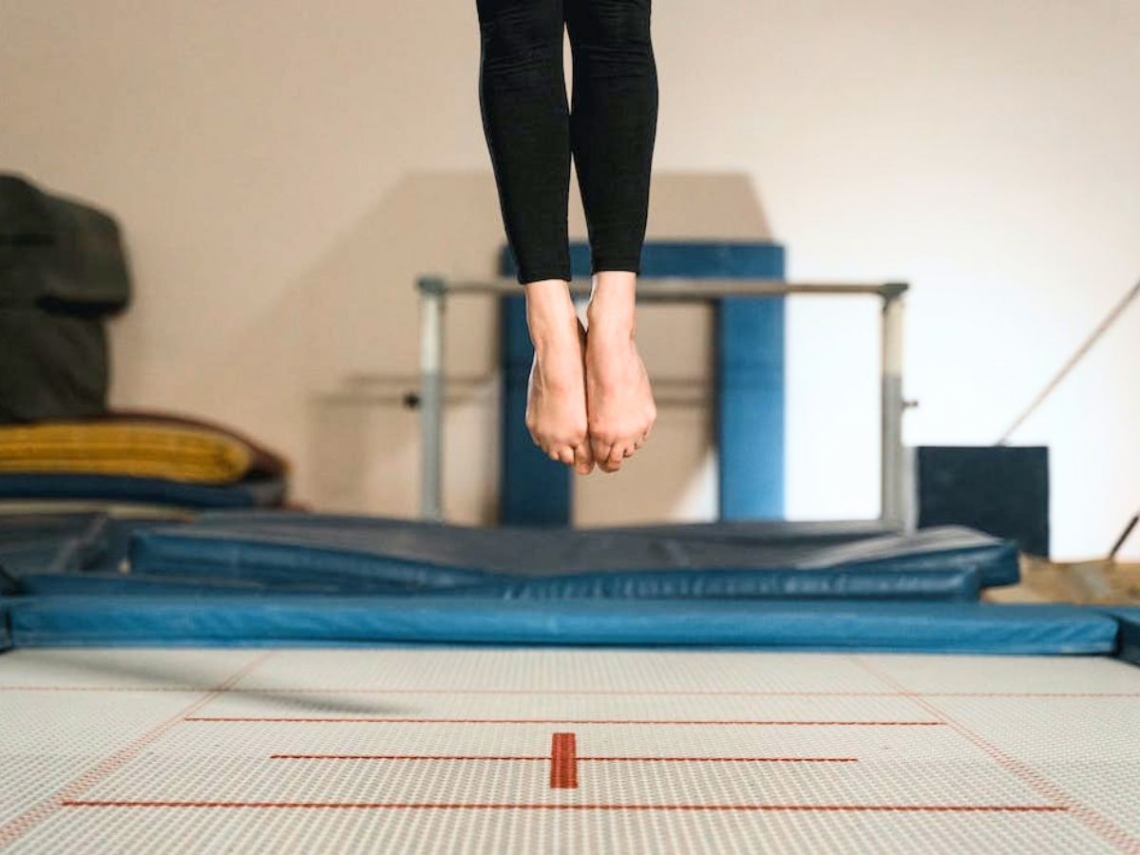
In-Ground Practice Options
To ensure optimal safety, some Olympic trampolines can be installed in-ground. This setup allows athletes to use the trampoline at ground level. Being on level with the ground maximizes safety and reduces the risk of serious injuries in case the jumper falls off the trampoline.
Number of Jumpers
Regardless of its massive size, an Olympic trampoline usually only accommodates one person at a time. If two jumpers were to perform on a single trampoline, one could impact the recoil of the other. This puts unnatural force on the second athlete's joints and increases the likelihood of injury.
Even during synchronized trampoline competitions, each gymnast is positioned on their own individual trampolines.
The Need for Spotters
During a sports competition, around 6 spotters position themselves around the trampoline to guide the athlete back to the centre in case they land too close to the edge.
On the other hand, children jumping around in their backyards aren't usually supervised the entire time, which increases the risk of injuries.
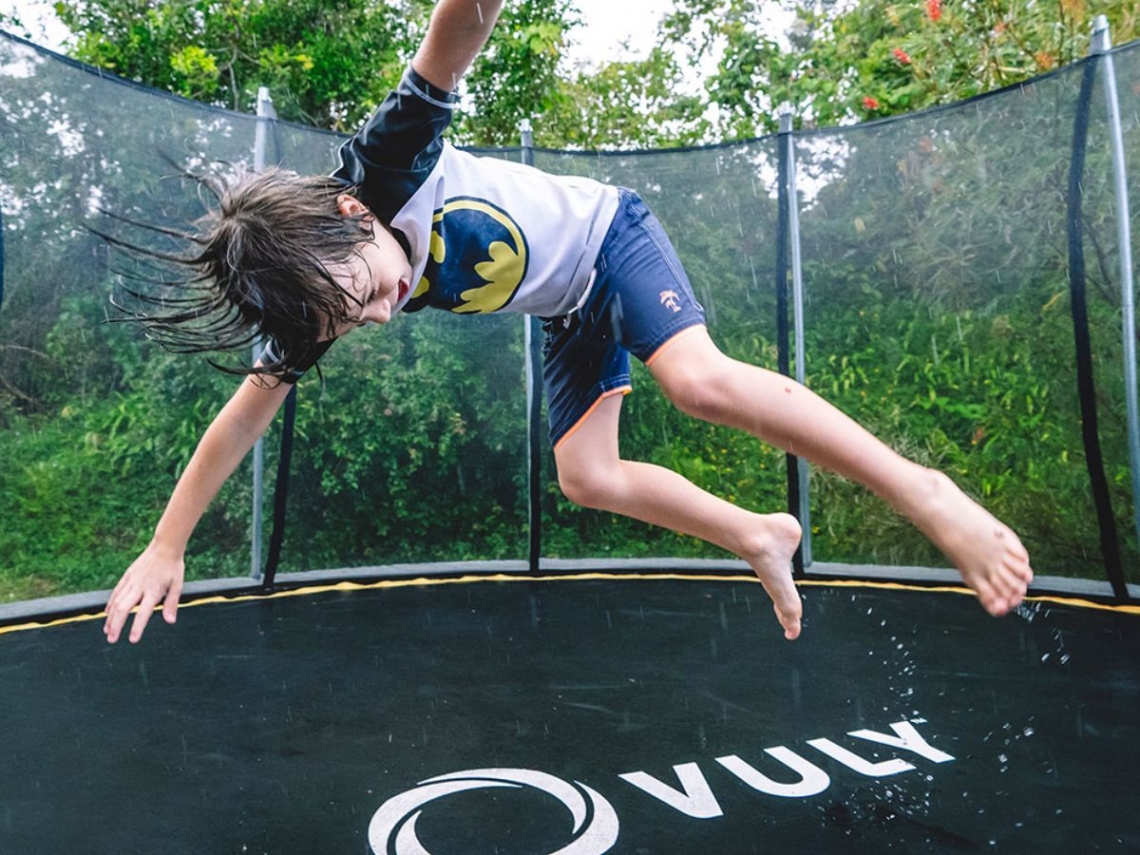
Backyard Trampolines
Shape
Unlike gymnastic trampolines, you'll find that backyard trampolines come in various sizes, such as oval, round, square, or rectangular as well.
Trampoline Bed
A backyard trampoline is commonly made from a non-porous material that offers a limited level of elasticity. If an athlete were to use a backyard trampoline, they could likely perform a maximum of 2 rotations without risking injury.
For kids, however, this level of elasticity is perfectly fine for performing some fun trampoline tricks.
Size
In terms of size, backyard trampolines can be as small as 6 feet in length. Depending on the footage of your yard, you can also opt for a larger one for optimal jump space for the kids.
Number of Jumpers
As mentioned above, an Olympic trampoline can safely accommodate one jumper, whereas a backyard trampoline (depending on the size and weight capacity) can carry up to 3 or 4 children.
Doodles Mark the Spot
While your run-of-the-mill backyard trampoline doesn't have that X marking that Olympic athletes can't be without, some playtime trampolines can be upgraded with cute doodle-peppered mats.
Hands down, no trampoline mats are cuter than the HexVex game mat designed by Vuly. Challenge your kids to stick their landing on the robot, star, ice cream cone, or Olympic torch for some friendly competition during playtime. Plus, it's great for improving hand-eye coordination (or foot-eye coordination). So, it's a double win!
Vuly Trampolines: Fun and Safety for Your Future Athletes
That wraps up our guide on Olympic trampolines vs. gymnastics trampolines vs. backyard trampolines.
When you want an ideal coalescence of playful and robust, all signs point to Vuly.
With outdoor play equipment expertise that is second to none, Vuly brings you a vast array of backyard trampolines that feature state-of-the-art safety standards. From sturdy galvanized frames with a premium finish to dual-ring steel foundations, you can rest assured that they can handle the pressure and withstand rust and heat.
Moreover, your little ones will be safe and sound during their trampolining adventures, as Vuly's safety features include a self-sealing door, a tall enclosure, and a safety net that prevents finger access. Thanks to our trampolines' thoughtfully designed structures, bouncers will never run the risk of making contact with the touch springs, poles, or frames.
Whether your kids are jump-loving babies for a season or are future Olympians of the sport, you will find that Vuly fits the mould in more ways than one.
Why choose between backyard standards and Olympic quality when you can have both? Browse our trampoline catalogue today!




















































